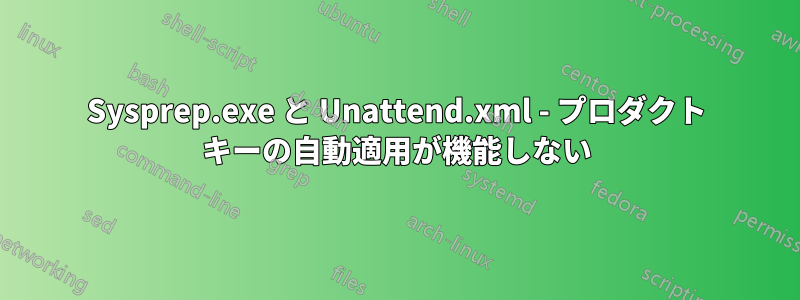
私の目標は、新しいプロダクト キーを入力する必要がなくなるように、OOBE プロセス (sysprep によって起動) を自動化することです。sysprep を介してこれを起動しているので、プロダクト キーはすでにあります。システムがすでにアクティブになっているので、この手順を完全にスキップしても問題ありません。ただし、システムで既に使用されているプロダクト キーを提供する方が簡単かもしれないと思いました。
初めて sysprep を使用しています。sysprep フォルダーに unattend.xml ファイルを保存しました。できるだけシンプルにしようとしました。ファイルは次のようになります。
<?xml version="1.0" encoding="utf-8"?>
<unattend xmlns="urn:schemas-microsoft-com:unattend">
<settings pass="specialize">
<component name="Microsoft-Windows-Shell-Setup"
processorArchitecture="amd64"
publicKeyToken="31bf3856ad364e35"
language="neutral"
versionScope="nonSxS"
xmlns:wcm="http://schemas.microsoft.com/WMIConfig/2002/State"
xmlns:xsi="http://www.w3.org/2001/XMLSchema-instance">
<ProductKey>xxxxx-xxxxx-xxxxx-xxxxx-xxxxx</ProductKey>
</component>
</settings>
</unattend>
これを生成するために、次の Microsoft ドキュメントを参照しました:https://technet.microsoft.com/ja-jp/library/cc732280%28v=ws.10%29.aspx より
しかし、これは機能しませんでした。通常の OOBE からの変更は見られず、プロダクト キーの入力を求める画面が引き続き表示されました。
sysprep.exe /oobe /reboot /unattend:unattend.xmlディレクトリに保存されている unattend.xml を使用して sysprep を起動しましたC:\Windows\System32\Sysprep。また、そのディレクトリからコマンドを実行しました。
StackExchange のトピックもいくつか閲覧しましたが、無人セットアップ ファイルに関連するトピックは多数存在しますが、そのほとんどは非常に古いか、プロダクト キーの適用とは関係ありません。
私の質問
sysprep によって開始された OOBE 中に、unattend.xml ファイルを使用してキーを自動的に適用するか、キーの適用をスキップするにはどうすればよいですか?
答え1
おそらくこれが役に立つでしょう
<component name="Microsoft-Windows-Security-SPP-UX" processorArchitecture="x86" publicKeyToken="31bf3856ad364e35" language="neutral" versionScope="nonSxS" xmlns:wcm="http://schemas.microsoft.com/WMIConfig/2002/State" xmlns:xsi="http://www.w3.org/2001/XMLSchema-instance">
<SkipAutoActivation>true</SkipAutoActivation>
</component>
<component name="Microsoft-Windows-Security-SPP-UX" processorArchitecture="amd64" publicKeyToken="31bf3856ad364e35" language="neutral" versionScope="nonSxS" xmlns:wcm="http://schemas.microsoft.com/WMIConfig/2002/State" xmlns:xsi="http://www.w3.org/2001/XMLSchema-instance">
<SkipAutoActivation>true</SkipAutoActivation>
</component>
または、ジェネレータを使用してみてください:http://windowsafg.no-ip.org/win10x86_x64.html


